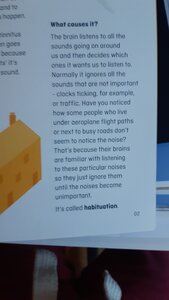Do you or anyone you know have the substantiation for this?Fact is, she's correct. For the overwhelming majority of people who get tinnitus it does get better or disappears over time.
There indeed may be 2 populations - one that experienced fleeting or temporary tinnitus for a couple of days after a concert. The other with chronic, permanent tinnitus. I'm fairly certain the definition for tinnitus used for NHANES is that symptoms (ringing) lasting 5 minutes qualifies as having tinnitus. So the distinction is a blur.
Its those with chronic tinnitus that seek out the help of the ATA and BTA, join those organizations, pay dues etc. They should be the primary focus for those organizations.
Those who have experienced temporary tinnitus need to heed the warning. The problem is hearing health is not given the same priority as vision and dental care. Most of us have an annual vision test and eye exam and many go to the dentist every 6 months for a cleaning and exam. We learn about that in the primary grades in school. But no-one does anything about maintaining their ears. And I've been told by an audiologist here in the US, that change will have to start with a grass roots movement because there are turf wars among the 4 agencies that regulate audiology and many levels of audiologists and hearing aid dispensers.
Furthermore, it would be beneficial to talk about avoiding loud noise, etc. to prevent hearing loss and tinnitus. Not just to prevent hearing loss. If that education started at a young age, we probably wouldn't be facing the current uphill battle trying to raise awareness to tinnitus.
ATA are an enigma.
TC

 Member
Member